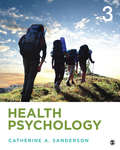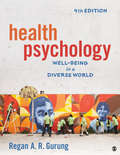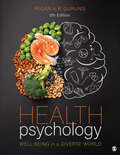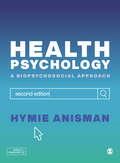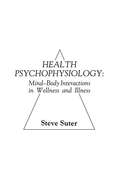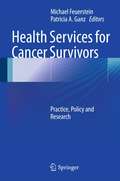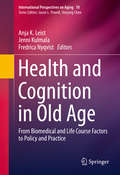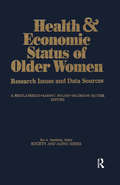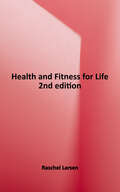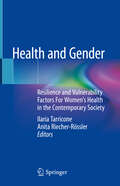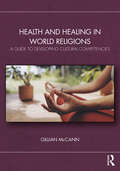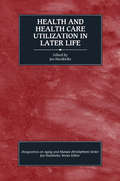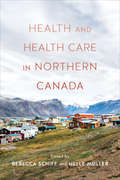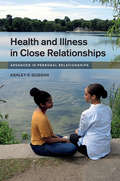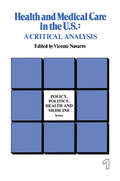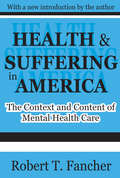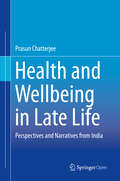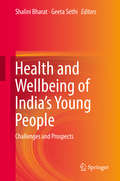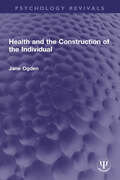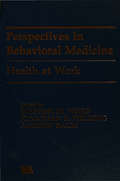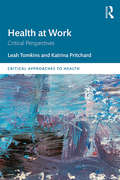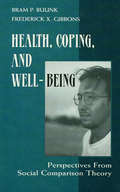- Table View
- List View
Health Psychology: Understanding the Mind-Body Connection
by Catherine A. SandersonHealth Psychology: Understanding the Mind-Body Connection introduces students to the story of health psychology through clear connections between the science and the real world. Using a highly accessible writing style, author Catherine A. Sanderson employs a strong emphasis on the scientific principles and processes underlying the field of health psychology to present balanced coverage of foundational research, cutting-edge research, essential theories, and real-world application. The Third Edition builds on its strong student-oriented pedagogical program, streamlines content, and includes recent studies, pop culture references, and coverage of neuroscience to support student learning and engagement. Students will enjoy reading the text because of its relevance in helping them live long and healthy lives.
Health Psychology: Well-Being in a Diverse World
by Regan A. GurungHealth Psychology: Well-Being in a Diverse World introduces students to the main topics and issues in health psychology through a unique perspective focused on diversity. Using a conversational tone, author A. R. Gurung explores the key determinants of behavior—such as family, environment, ethnicity, and religion—and connects concepts to personal experiences for students to gain a deeper understanding and appreciation of the material. Extensively updated based on over 1,000 new articles cited, and with a new chapter on research methods, the Fourth Edition reflects the latest cutting-edge research in the field to explain more thoroughly how context and culture are important predictors of healthy behavior.
Health Psychology: Well-Being in a Diverse World
by Regan A. GurungHealth Psychology: Well-Being in a Diverse World introduces students to the main topics and issues in health psychology through a unique perspective focused on diversity. Using a conversational tone, author A. R. Gurung explores the key determinants of behavior—such as family, environment, ethnicity, and religion—and connects concepts to personal experiences for students to gain a deeper understanding and appreciation of the material. Extensively updated based on over 1,000 new articles cited, and with a new chapter on research methods, the Fourth Edition reflects the latest cutting-edge research in the field to explain more thoroughly how context and culture are important predictors of healthy behavior.
Health Psychology: Well-Being in a Diverse World
by Regan A. R. GurungWhat factors determine healthy behavior? Health Psychology: Well-Being in a Diverse World answers this question by introducing and regularly applying research to stress, coping, interventions and health behaviors in today’s world. Speaking directly to students, Regan A. R. Gurung’s conversational voice guides learners through the key determinants of behavior, such as family, environment, ethnicity, and religion. Each chapter delves into the biological foundations of health, presents interdisciplinary case studies, and integrates personality and social psychological theories, fostering a comprehensive grasp of the subject. Continually asking readers to think further, to synthesize, to analyze, and to apply to improve their own health outcomes as they learn, Gurung empowers students through connections to personal experience. The Fifth Edition offers contemporary reference updates, an expanded focus on intersectional topics across cultures, test yourself practice, and much more. This title is accompanied by a complete teaching and learning package. Contact your Sage representative to request a demo. Learning Platform / Courseware Sage Vantage is an intuitive learning platform that integrates quality Sage textbook content with assignable multimedia activities and auto-graded assessments to drive student engagement and ensure accountability. Unparalleled in its ease of use and built for dynamic teaching and learning, Vantage offers customizable LMS integration and best-in-class support. It′s a learning platform you, and your students, will actually love. Learn more. LMS Cartridge: Import this title’s instructor resources into your school’s learning management system (LMS) and save time. Don’t use an LMS? You can still access all of the same online resources for this title via the password-protected Instructor Resource Site. Learn more.
Health Psychology: Well-Being in a Diverse World
by Regan A. R. GurungWhat factors determine healthy behavior? Health Psychology: Well-Being in a Diverse World answers this question by introducing and regularly applying research to stress, coping, interventions and health behaviors in today’s world. Speaking directly to students, Regan A. R. Gurung’s conversational voice guides learners through the key determinants of behavior, such as family, environment, ethnicity, and religion. Each chapter delves into the biological foundations of health, presents interdisciplinary case studies, and integrates personality and social psychological theories, fostering a comprehensive grasp of the subject. Continually asking readers to think further, to synthesize, to analyze, and to apply to improve their own health outcomes as they learn, Gurung empowers students through connections to personal experience. The Fifth Edition offers contemporary reference updates, an expanded focus on intersectional topics across cultures, test yourself practice, and much more. This title is accompanied by a complete teaching and learning package. Contact your Sage representative to request a demo. Learning Platform / Courseware Sage Vantage is an intuitive learning platform that integrates quality Sage textbook content with assignable multimedia activities and auto-graded assessments to drive student engagement and ensure accountability. Unparalleled in its ease of use and built for dynamic teaching and learning, Vantage offers customizable LMS integration and best-in-class support. It′s a learning platform you, and your students, will actually love. Learn more. LMS Cartridge: Import this title’s instructor resources into your school’s learning management system (LMS) and save time. Don’t use an LMS? You can still access all of the same online resources for this title via the password-protected Instructor Resource Site. Learn more.
Health Psychology: a Biopsychosocial Approach
by Hymie AnismanProviding a thorough biopsychosocial approach, Health Psychology is your ideal companion to studying this subject. Exploring bio-social, developmental and lifestyle factors and how these relate to physical and psychological disturbances, this lively and approachable guide takes you through this key topic for psychology, health sciences, nursing and education students. Using case studies and up to date research, the author brings to life the important practical applications in this area, helping you to understand the varied ways the biological, physiological and social factors affect psychology and how effective interventions can influence the health of a population.
Health Psychology: a Biopsychosocial Approach
by Hymie AnismanProviding a thorough biopsychosocial approach, Health Psychology is your ideal companion to studying this subject. Exploring bio-social, developmental and lifestyle factors and how these relate to physical and psychological disturbances, this lively and approachable guide takes you through this key topic for psychology, health sciences, nursing and education students. Using case studies and up to date research, the author brings to life the important practical applications in this area, helping you to understand the varied ways the biological, physiological and social factors affect psychology and how effective interventions can influence the health of a population.
Health Psychophysiology: Mind-body Interactions In Wellness And Illness
by S. SuterMost military researchers who have attempted to measure organizational commitment have done so on an ad hoc basis, preferring to invent new items and scales rather than incorporate well-established measures. The purpose of this special issue is to reverse this trend by bringing military organizational commitment research into the scientific mainstream and to do so in ways that will prove useful to military services while advancing organizational commitment theory and knowledge. This special issue grew out of a symposium conducted at the 1998 American Psychological Association Convention that arose when many in the field recognized the practical importance of measuring organizational commitment while maintaining a healthy concern for ensuring that this measurement was well-grounded in organizational commitment theory. Taken together, the articles in this issue demonstrate the concepts of affective and continuance commitment and their underlying measures by using them in different military samples and under a variety operational conditions.
Health Services for Cancer Survivors
by Michael Feuerstein Patricia A. GanzHealth has been conceptualized by world and national health organizations (WHO, CDC, Healthy People 2010) as more than the absence of disease. It involves a focus on physical, psychosocial, and functional aspects of life as well as the prevention of future illnesses. At this point in the development of quality health care for cancer survivors, there is sufficient knowledge and expert opinion to push efforts forward to improve the health of cancer survivors. Clearly there is more research in the most prevalent forms of cancers (e.g., breast cancer) than others that provide us with guidance on how to optimize their health, but there are data on other forms of cancers that can also better inform practice. There may also be general care practices that can cut across cancer types. There has been an emergence of epidemiological and clinical research in cancer survivors that can form the basis for a revolution in the quality and nature of health care that survivors receive. This book not only provides the reader with diverse perspectives and data but also integrates this information so it can serve as the foundation necessary to improve and maintain the health of cancer survivors. Reporting of symptoms to health care providers is a complex, multi-determined problem influenced not only by the pathophysiology but also, as we have learned over the years through pain research, by societal, cultural, and biobehavioral factors. This book will consider this important aspect of follow-up for millions of cancer survivors because of the strong reliance on symptom reporting for clinical decision making. In order for us to generate meaningful and effective treatment, we need to better understand the symptom experience in cancer survivors. This book provides much information that will assist us to better understand and manage this complicated end point. The presenting problems need to be articulated and "conceptualized" as clearly as possible by both parties so appropriate actions can be taken. Since health care costs are a major concern for patients, payers, and providers, this area will also be addressed in all the relevant sections. In taking an interdisciplinary perspective, this book illustrates the importance of a team approach to the improvement of health care and associated health, well-being, and functioning in cancer survivors. The 17 chapters cover critical topics of which physicians and providers of all types must be aware in order to provide the most comprehensive and responsive care for cancer survivors. All of the clinical care chapters include case studies to illustrate the real-world application of these approaches in cancer survivors. Information about sources of referral both within and outside the traditional health care communities will be provided in tabular form. There is no other text that provides both an overview of the problems and their challenges, case illustrations of direct application, and the reality of reimbursement for such care. The editors hope that there may be no need for the clinician or the survivor to adapt to a "new normal" if the presenting problems are understood and handled from an interdisciplinary perspective as outlined here.
Health and Cognition in Old Age
by Fredrica Nyqvist Anja K. Leist Jenni KulmalaIn recent years, the aim of research on aging has shifted from prolonging life to fostering healthy and cognitively robust old age. In order to improve the quality of life of older people, we need to better understand cognitive aging as well as bodily aging. Health and Cognition in Old Age assembles the cream of research across varied medical, mental health, and social disciplines, and demonstrates how this knowledge can lead to improved outcomes for older people. The first half of this expert volume discusses biomedical and life course factors in aging, particularly as they affect cognition and well-being in later life. From there, effective solutions are the focus: interventions and care programs to improve mental functioning and general quality of life, and current policy and practice ideas in promoting healthy, active, and cognitively robust aging. Together, these diverse chapters offer a multi-faceted approach to understanding and modifying what was formerly the inevitable course of growing old. A sampling of the coverage: How the aging process affects the immune system. Occupational gerontology - work-related determinants of old age health and functioning. Social, behavioral, and contextual influences on cognitive function and decline. Lifestyle factors in the prevention of dementia. Understanding long-term care outcomes: conventional and behavioral economics. Social capital, mental well-being, and loneliness in older people. For gerontologists, sociologists, social workers, health psychologists, and others working to improve older people's lives, Health and Cognition in Old Age brings expertise, versatility, and confidence to the table.
Health and Economic Status of Older Women
by A.Regula Herzog Karen C Holden Mildred M SeltzerHealth & Economic Status of Older Women is a collection of research issues and data sources. This book is organized in three parts. Part 1 sets the stage for the more focused discussion of health and economic issues in the lives of old women that follows in Part 2. This first section contains papers by both Troll and Reinharz. Their papers - presented as keynote addresses in the conference - provide a historical context for the subsequent material. Both authors issue challenges to those who would focus their research efforts on older women. The second part of the book contains the substantive discussions of health and economic aspects of women’s lives. The final part contains discussions of research methodologies.
Health and Fitness for Life 2nd edition
by Raschel LarsenThis book is an introductory college textbook that shows students how to improve their habits related to physical activity, eating, or stress management. With a focus on real-world activities and practices for increasing overall wellness, this book includes grounded examples of practical health-based situations and healthy choices from diverse perspectives that will give students strategies for identifying and improving areas of their health. This book covers the basics of exercise and healthy living, as well as more advanced topics, including: -Cardiorespiratory fitness - Muscular strength and endurance - Flexibility training and mobility - Body composition - Nutrition planning and guidance - Stress management - Chronic and infectious disease - Substance use and abuse - Environmental health This book’s data-driven study of health and fitness is goal-oriented, instructive, and encouraging for students of varying backgrounds and states of wellness. The approach in these pages creates relevant links between guidance from official health organizations and everyday life. There’s something for everyone here, whether you’re looking to improve habits related to physical activity, eating, or stress management, or to better understand your place in the world as a healthy individual. Written by community college health faculty, Health and Fitness for Life blends down-to-earth instructional text with numerous examples of relevant situations and outcomes for students from all demographics.
Health and Gender: Resilience and Vulnerability Factors For Women's Health in the Contemporary Society
by Anita Riecher-Rössler Ilaria TarriconeThis book presents a concise and comprehensive overview of the most important protective and risk factors for women's health, and reviews the main areas of medical science from a gender perspective. Numerous scientific experiments and studies have shown how gender differences significantly affect the clinical presentation of physical and mental health disorders as well as responses to treatments. This text highlights these issues, while at the same time reflecting on the practical implications of the theoretical knowledge presented. It also examines the organization of social and health services, which should increasingly take into account the specificities related to gender differences and where equality is based on truly embracing these differences. The final part provides insights into the experiences and testimonies collected by the authors of the book. Written by a multidisciplinary team of medical, psychosocial and humanities professionals, this book is of interest to health professionals and medical students.
Health and Healing in World Religions: A Guide to Developing Cultural Competencies
by Gillian McCannHealth and Healing in World Religions is a comprehensive introduction to the field that explores the research that links spirituality and well-being, including work with addiction and trauma.Each chapter includes an introduction to and summary of each tradition, questions at the conclusion, and boxes that highlight key ideas from the chapter using an example and interviews with medical professionals and other healers. Health and Healing in World Religions looks at cutting edge interfaces between spirituality and health such as mindfulness practices, addiction programmes, indigenous approaches to healing, traditional Chinese medicine, yoga and Ayurveda, and more. The text provides an overview of the research and practice all in one place and includes extensive bibliographies and resource guides for ease of reference.Health and Healing in World Religions is derived from over 20 years of teaching and research in health and healing and comes from an in-depth understanding of religion and spirituality. It is a vital guide to understanding cultural competency in the healing professions and the need to understand the cultural and spiritual traditions of clients.
Health and Health Care Utilization in Later Life (Perspectives On Aging And Human Development Ser.)
by Jon HendricksThe debate over national health insurance has renewed attention on the health and health care utilization of the elderly. Few questions have been more poignant than the health of the United States' elderly. As a broad-ranging critical look, "Health and Health Care Utilization in Later Life" brings the central questions facing the elderly into bold relief. It spans the range of health concerns the elderly face daily. The debates over health care rage, often without having the relevant facts. "Health and Health Care Utilization in Later Life" brings the facts to the fore but just as importantly, it brings a sensitive feeling for the realities of health as a driving force in the daily lives of old people.
Health and Healthcare in Northern Canada
by Rebecca Schiff and Helle MøllerAccounting for almost two-thirds of the country’s land mass, northern Canada is a vast region, host to rich natural resources and a diverse cultural heritage shared across Indigenous and non-Indigenous residents. In this book, the authors analyse health and health care in northern Canada from a perspective that acknowledges the unique strengths, resilience, and innovation of northerners, while also addressing the challenges aggravated by contemporary manifestations of colonialism. Old and new forms of colonial programs and policies continue to create health and health care disparities in the North. Written by individuals who live in and study the region, Health and Health Care in Northern Canada utilizes case studies, interviews, photographs, and more, to highlight the lived experiences of northerners and the primary health issues that they face. In order to maintain resilience, improve the positive outcomes of health determinants, and diminish negative stereotypes, we must ensure that northerners – and their cultures, values, strengths, and leadership – are at the centre of the ongoing work to achieve social justice and health equity.
Health and Illness in Close Relationships (Advances in Personal Relationships)
by Ashley P. DugganHealth and Illness in Close Relationships provides an integrated theoretical framework for understanding the complexities of health trajectories and relationship processes. It is the first volume to review and synthesize current empirical evidence and associated theoretical constructs from the literature on health and illness in close relationships across the social and behavioral sciences. In doing so, it provides a unique cross-disciplinary understanding of how health and illness redefine relationships. The volume also maps out an explanatory framework of how the pathways and processes of close relationships pose considerations for resilience and flourishing or, on the contrary, for relational and health decline. It will appeal to researchers and students across psychology, communication, and relationship studies, as well as to health professionals who are interested in understanding how health conditions can shape or be shaped by patients' close relationships.
Health and Medical Care in the U.S.: A Critical Analysis (Policy, Politics, Health and Medicine Series)
by Vicente NavarroA collection of papers that challenge the conventional analyses of the problems facing health, medicine and medical care in Western societies in general, and North America in particular.
Health and Suffering in America: The Context and Content of Mental Health Care
by Robert T. FancherHealth and Suffering in America analyzes how we came to see various forms of suffering as "mental illness," and argues that social and historical dynamics, not scientific discovery, gave us this notion. Robert Fancher argues that the beliefs of mental health professionals have less to do with science than with the professions' own values and ideologies. The image we have of mental health care hides vast realms of unexamined assumptions. In effect, the author maintains that "mental health" consists of mental health professionals' ideas about how people ought to live and act, not discoveries about human nature. The body of the book consists of detailed analyses and critiques of four infl uential American cultures of therapy: psychoanalysis, behaviorism, cognitive therapy, and biological therapy. Fancher emphasizes how heavily their concepts and methods are determined by their cultures rather than by empirical data. Furthermore, our notions of mental health are not scientifi c discoveries, but moral ideals. Yet mental health workers often fail to understand this. As a result, they misunderstand their own authority and, worse, fail to subject their moral ideals to appropriate moral and cultural criticism. The new introduction by the author explores how the rise of managed health care coalesces with insistence on parity for mental health problems, supported by continuing claims that mental health care is science-based.
Health and Wellbeing in Late Life: Perspectives and Narratives from India
by Prasun ChatterjeeThis open access book takes a multidisciplinary approach to provide a holistic understanding of late old age, and situates the aged person within the context of family, caregivers, clinical and other institutions. All through the book, the author discusses preparedness for an aging individual as well as the society in the Indian context. The book highlights inevitable but mostly neglected health issues like depression, dementia, fall, and frailty and provides detailed analyses of solutions that are practicable in low resource settings. It also brings up intergenerational differences and harmony in the context of holistic care of older Indians. Alongside clinical perspectives, the book uses narratives of elderly patients to dwell on the myriad of problems and issues that constitute old age healthcare. Demonstrating cases that range from the most influential to the most underprivileged elderly in India, the book enlightens multiple caregivers—doctors, nurses, and professional caregivers as well as family members—about the dynamic approach required in dealing with complex issues related to late old age. The narratives make the book relatable and interesting to non-academic readers, with important lessons for gerontological and geriatric caregiving. It is also of use to older adults in preparing for active aging.
Health and Wellbeing of India's Young People: Challenges and Prospects
by Shalini Bharat Geeta SethiThis volume fills a major gap in the evidence base on adolescents and youth in India by bringing together research, policy critiques and programme analyses in an intersectoral and multidisciplinary way. With about 373 million persons between the ages of 10 and 24 years, India has the largest number of young people of any country in the world. While this large cohort presents an excellent opportunity to reap a rich demographic dividend, their potential can be realised only with intelligent investments, which create well nourished, healthy, appropriately educated and skilled youth. This volume is based on desk reviews and is complemented by discussions with experts in 4 key thematic areas: nutrition, sexual and reproductive health, mental health and livelihoods, overall focusing on the health and wellbeing of the young in India. Each chapter provides a comprehensive picture of the current situation in a focal theme and identifies significant gaps in information/data and programmes. In addition, it explores the scenario of building capacity for undertaking research on, and with adolescents, through a qualitative needs assessment. This timely volume provides a thorough overview of related research, policy and programmes for a wide group of social and behavioural scientists and public health experts interested in India’s young people.
Health and the Construction of the Individual (Psychology Revivals)
by Jane OgdenHow do social scientists create facts? What strategies do they use to construct knowledge? How does social science make sense of the individual? Critical studies of both medical and scientific knowledge have been conducted but social science knowledge remains relatively unquestioned. Addressing this question, Health and the Construction of the Individual, originally published in 2002, is a social study of social science. Jane Ogden focuses particularly on constructions of the individual in health-related psychology and sociology. She explores how social science texts construct social science facts using the strategies of theory, methodology, measurement, and rhetorical boundaries and argues that the individual is not only constructed through the dissemination of social science knowledge but through the mechanics of its production. The results provide a unique insight into the transformation of the individual as an ever-changing self, from both a historical and social constructionist perspective. This title will make fascinating reading for health psychologists, medical sociologists, social constructionists and all students and researchers interested in gaining a greater understanding of the premises underlying social science.
Health at Work (Perspectives on Behavioral Medicine Series)
by Andrew Baum Stephen M. Weiss Jonathan E. FieldingThis book focuses on the major issues surrounding worksite health promotion programs. It identifies and discusses examples of the most intensively studied programs (such as Johnson and Johnson's "Live for Life," and AT&T's "TLC"), and considers the "state of science" for the four most frequently offered health-promotion program components: smoking cessation, weight control, exercise, and stress management. As is becoming increasingly evident, worksite health-promotion activities pose their own unique set of challenges -- challenges that are likely to have a significant impact on national health status and costs. Crucial areas addressed in this volume include program development and design, cost benefit/cost effectiveness, and legislative/policy issues.
Health at Work: Critical Perspectives (Critical Approaches to Health)
by Leah Tomkins Katrina PritchardEngaging with some of the most debated topics in contemporary organizations, Health at Work: Critical Perspectives presents a critical, contingent view of the healthy employee and the very notion of organizational health. Drawing on expressions such as ‘blowing a fuse’, ‘cracking under pressure’ or ‘health MOT’, this book suggests that meanings of workplace health vary depending on how we frame the underlying purpose and function of organization. Health at Work takes some of the most powerful and taken-for-granted discourses of organization and explores what each might mean for the construction of the healthy employee. Not only does it offer a fresh and challenging approach to the topic of health at work, it also examines several core topics at the heart of contemporary research and practice, including technology, innovation, ageing and emotions. This book makes a timely contribution to debates about well-being at work, relevant to practitioners, policy-makers and designers of workplace health interventions, as well as academics and students. This book will be illuminating reading for students and scholars across management studies, occupational health and organizational psychology.
Health, Coping, and Well-being: Perspectives From Social Comparison Theory
by Frederick X. Gibbons Bram P. BuunkOver the past decades, the field of health psychology has witnessed a tremendous growth, and social psychologists have contributed substantially to the theoretical foundation of this field. Their research has focused on a wide variety of health-relevant topics such as how individuals decide to respond to threats to their health and well-being, how and why they change their behavior to avoid such threats, and especially, how they adjust to or cope with the risk of threatening disease and with the diseases themselves. As diverse as this literature may be, however, there does appear to be a common theme throughout much of it--the observation that comparison of oneself and one's health status and coping efforts with others is an integral part of the coping process. Consequently, social comparison theory is increasingly becoming recognized as a fruitful framework for illuminating health related issues. A still expanding literature is exploring the role of social comparisons with respect to coping with a wide range of health problems, including cancer, physical decline among the aged, rheumatoid arthritis, AIDS, stress at work and occupational burnout, and eating disorders. Social comparison theory has augmented knowledge about the ways in which people cope with stressful events, and thus has contributed significantly to it. At a more basic level, research in this applied context has made significant contributions to the development of social comparison theory itself. The present volume presents an overview of the various ways in which social comparison theory has been applied to issues related to health, coping, and well-being, and also points out how these applications have contributed to our insight into the way humans employ social comparison information. Given the attention paid to theoretical and applied issues, this volume will appeal to a wide audience, including social and health psychologists, as well as therapists, physicians, clinicians, medical sociologists, nurses, and those involved in the growing field of nursing research.
